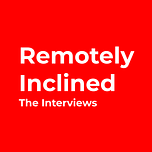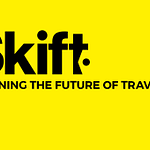Hi,
Welcome to Remotely Inclined, a newsletter about running a business remotely. If you’d like to sign up, you can do so here. Want to share your feedback? Respond to this email (or send me one). Or just read on…
First: I recently stumbled upon Hauniv, an amazing monthly email digest of the startups that have raised money (they manually verify the data - no robots). If you’re interested in the startup space, you should definitely check them out.
Today: We’re talking about how to build a thriving remote business of one with Anna Codrea-Rado, a NYT and Guardian journalist turned remote entrepreneur.
Anna Codrea-Rado started her career as a journalist, eventually getting laid off by Vice Media in one of their mass layoffs. Instead of getting another job, Anna decided to go freelance, publishing pieces in the New York Times, Guardian, and more. From there, she built a fully-fledged business of one with multiple streams of income coming her way.
In our interview, Anna shared how she started her business of one, the process she used to build multiple streams of income, and how she continues to expand even though she is still her only employee.
Setting up multiple streams of income
→ When Anna was laid off, she decided to go freelance and her main income source became pitching and selling stories to major media outlets or magazines. She knew she wanted to grow her income in other ways, so she looked at building out new opportunities.
→ Now, Anna still writes for major outlets but also has: A podcast, a paid newsletter, online courses, and a forthcoming book on building a freelance business of one.
→ Getting to this point required a shift in thinking. Here’s are the questions Anna asked herself that led to identifying new business opportunities:
Who else wants your skills? In Anna’s case, she started with media outlets but corporate blogs wanted her skills as well, which opened new client opportunities.
Who can you teach your skills to? Anna taught writing in journalism schools and now teaches freelancers how to build their businesses.
What else can your skills produce? Instead of only writing for media outlets, Anna started self-publishing her newsletter, The Professional Freelancer, and is now writing a book.
How can you step out of your comfort zone but lean on your current skills? Everything Anna does is based on her skills as a writer and journalist, so she has a higher chance of success from the start.
Building your own support systems
→ As freelancers and solopreneurs, it’s easy to feel lonely, isolated, or just plain alone with no one to ask for help or advice.
→ Anna found that the way around this is to find two kinds of people:
General support such as a spouse or friend. The one who will tell you it’s going to be alright when things get touch.
Colleagues / “work spouses.” This is the person you can turn to with professional issues who can offer real advice based on relevant experiences.
→ Once you have your support systems in place (Anna calls it your “emotional emergency fund”), it becomes a lot easier to stand up for your rights to be paid fairly, paid on time, and treated well. Solopreneurs work with multiple stakeholders, often with a power dynamic involved, so having additional support systems help give you the courage to ask for what you deserve.
The final word
“[Growing my business] was about learning my options, what made sense for me, and going one step out of my comfort zone but very much leaning on my existing skillset.”
Remotely Inclined Chats with Anna Codrea-Rado
Transcript edited for brevity and clarity.
Stefan: Welcome, Anna! Can you share what your business is all about?
Anna: We were just saying before recording that there isn’t really a neat word for encapsulating everything that I do, but I always say first and foremost that I am a journalist. That’s what I’ve done for the past three years working remotely for myself. Beyond that I am building out more of a digital business. I still do traditional journalism for legacy media organizations like the New York Times, Wired, and the Guardian. Then I have a newsletter called The Professional Freelancer. It’s on Substack, which is how we got to know each other - through the Substack community. I also have a podcast called Is This Working, which is about the messy parts of work. And I campaign for freelancer workers’ rights while working on a book - it’s a guidebook for freelancers and anyone else who wants to work for themselves.
You built a lot of revenue streams for your business. What are the mechanics behind your business and its growth?
I believe very passionately that a diverse portfolio of income streams is really fundamental for anyone, regardless of whether you’re employed full-time, a freelancer, or whatever your business structure looks like. Multiple revenue streams provide a bit more stability and security - they spread the risk out. It’s simply not putting all your eggs in one basket.
I also think that there’s a bit of an image problem with multiple streams of income because it’s such an unsexy phrase. I know we have side hustler, but I don’t think that quite gets to it either.
I got into freelancing in 2017 when the company I was working for, Vice Media, pivoted to video and had a massive global layoff. I started with my existing skill sets and how I could package them up differently and sell them to different types of clients or in a different format.
So you think about large businesses and think about it in terms of B2B or B2C. I’m both since I sell to individuals and to large organizations.
I built it all one by one. I started with traditional journalism - selling articles and stories to newspapers and magazines. Then I started adding new ones. I started doing some public speaking. Then I started doing some teaching and 1-1 coaching. Selling the newsletter came a bit further down after I’d built up the audience.
It was about learning my options, what made sense for me, and going one step out of my comfort zone but very much leaning on my existing skillset.
How can people get started finding that first “thing” they can use to become the foundation of their business?
Start with an audit of your own skills and what you’re doing, because it’s easy to forget how valuable the skills you already have are. If you’re doing it repeatedly or have been doing it for many years, you take for granted that you have something very valuable. It’s a good idea to think about who else might want to have that thing.
Take myself for example. My main thing was writing journalism. So then I thought about what other offshoots come from that. One of them is that I can teach the business of freelancing and the business of journalism. That is often a first step when you’re thinking about multiple income streams: what skill can you teach to others?
For a lot of people, it’s easier to teach than you might think it is. And you can teach in lots of different formats. I’ve taught guest lectures at journalism schools. But you can set up your own webinars or online events - or in person events if we ever get back to a time when we do those.
Then you can think about who else wants the actual skill. In my case, it’s distilling complex ideas into easily digestible copy. That’s a skill that not just media outlets want to buy. So you can take it and sell it to companies that maybe want to start a blog. And then you can end up in a place where you’re selling directly to your readers.
It’s really starting with how am I looking at something and what are other ways it could work for me.
How do you balance advocating for your own rights as a freelancer with so many stakeholders and clients?
It’s much easier said than done. But I have been advocating for freelance workers’ rights, particularly around pay. I have two campaigns at the moment. One is about late payment terms in the media and journalism industry, since all freelancers face issues with getting paid on time because of the power imbalance.
Then I have a campaign around pay disparities in what I’ve identified as the freelancer pay gap - differences in pay that freelancers experience depending on a number of factors like gender, race, ethnicity, age, location, and all of these things. On top of that, there’s a disparity between what a freelancer gets paid versus an in-house person, with wages in favor of the in-house employee.
Nonetheless there are structural problems that make freelancing unnecessarily difficult. So as freelancers it’s really important that we educate ourselves on what our rights actually are and then try as hard as we can to stand up for them.
As a solo business owner, you can also work with other people. You can hire people to help you out. I’ve recently started working with a bookkeeper, since it’s difficult and draining and this person is better at it than I am. I’m paying for peace of mind and mental health, basically. It can be scary when you work for yourself and think that hiring someone is scary and daunting. But in the long run it’s investing in not only your business but yourself.
What’s your advice for folks just getting started in their business?
This might sound counterintuitive, but I think when you are a business of one you need a work spouse or freelance advisors - your kind of freelance board of executives.
However you want to think about it, you need people. You need them to support you but also people to give you solid business advice and who can talk to you about your specific issues. The number one challenge freelancers face when they work alone is there’s no one to turn to. I’ve lost so many hours just to self-doubt because I haven’t had someone who can share an idea.
You also need an emergency fund and all of that practical stuff. But there’s an emotional side of working for yourself - you need the emotional equivalent of that emergency fund. Build up that support network - it will pay off in the long run rather than finding yourself in a position where you need that network and then not knowing where to find it.
Amazing, thank you for your insights!
You can get in touch with Anna and Instagram and Twitter. You can pre-order her book on Amazon.

Image via Instagram














Share this post